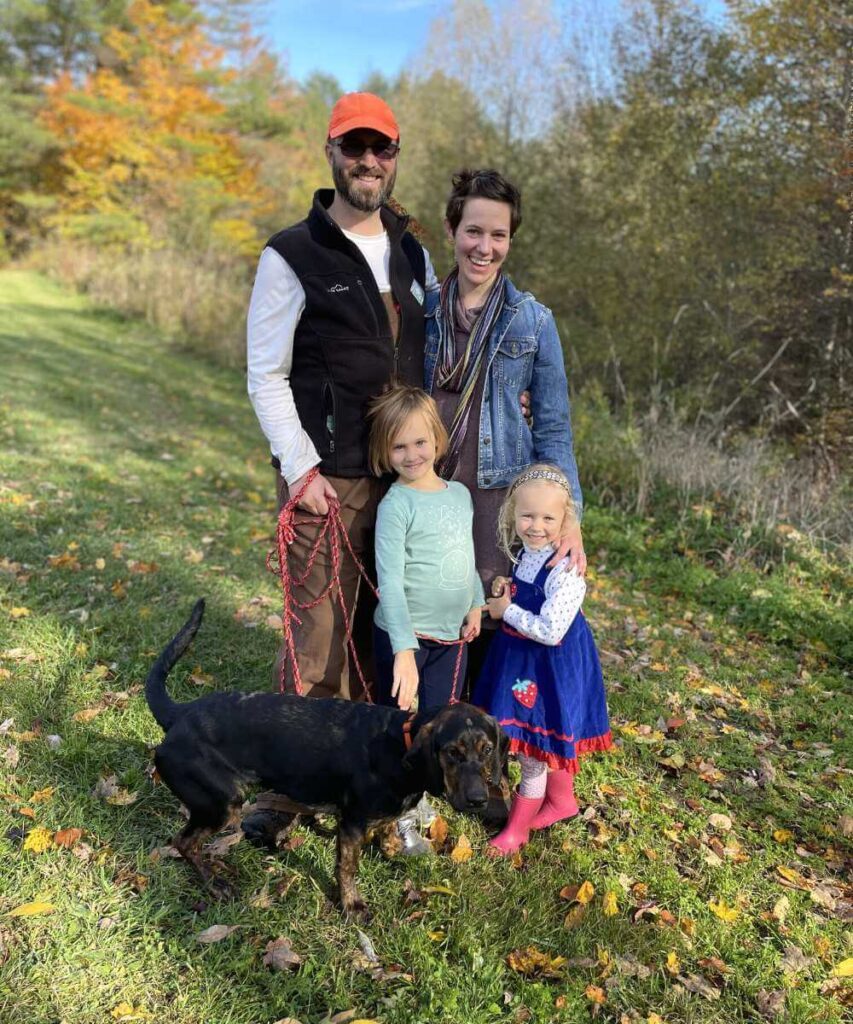This post was last updated on December 5th, 2022 at 04:45 pm
Aren’t we all looking for ways to save money? Elizabeth Thames’ website, Frugalwoods, is about how to do just that—and much more. She seeks to empower her readers to take control of their finances, while providing insights into how frugality helped her family achieve financial independence. For Elizabeth, frugality is a lifestyle.
“There are just so many advantages to incorporating frugality,” she said during a recent interview with Frugalmatic. “There’s less to keep track of, less to stress about, less to think about. It really allows you to focus on your highest and best priorities.”
Elizabeth and her husband, Nate, began their frugal journey years ago while holding office jobs in Cambridge, Mass. They made adequate money, but they felt unfulfilled. In April 2014, Elizabeth started Frugalwoods, and her family moved to rural Vermont, where they now live on a 66-acre homestead. Although only in their 30s, they’ve paid off their mortgage. Elizabeth works part-time, while Nate retired last year from a software engineering job.
All in the details: Frugalwoods monthly expense reports
Elizabeth describes herself and Nate as “average people,” but the focus that the couple brings to their daily routines is far from average. On her website, she provides a breakdown of the family’s monthly expenses. It makes for interesting reading, while also helping Elizabeth and her family stay on the frugal course.
“It certainly is a mindfulness exercise every month, and I do actually check in on myself, ‘Oh, do I really want to buy this? Do I really want this to show up on the expense report?’ And sometimes I will say, ‘You know, I don’t need XYZ, a pair of shoes, a doughnut, or whatever it is,'” Elizabeth said.
Closely tracking expenses can help people become more consistent in their spending habits. “Do you want to see that expense at the end of the month? How will you feel? Maybe the answer is yes, and maybe it’s no,” she said.
However, Elizabeth does not advocate deprivation. She told me, “I always say if you’re depriving yourself, you’re doing it wrong. It’s about finding out, ‘How can I spend within reason but really have a full life?'”
Keepin’ it frugal with a 31-day challenge
If you’re interested in developing better spending habits, you might consider taking Elizabeth’s free 31-day Uber Frugal Month Challenge. I personally completed this program two years ago, and it prompted a lot of self-reflection. While I consider myself frugal, I uncovered some areas in my life that I decided could use improvement.
Elizabeth joins her readers in taking this challenge twice a year, and the next one starts in January 2023. For the upcoming challenge, she plans to also host what she calls UFM Mastermind Groups. Groups of 10 people each will meet with her in video calls once a week during the challenge to answer questions and offer support and guidance.
Along with the mastermind groups, Elizabeth has added another service to Frugalwoods: private financial consultations. For several years, Elizabeth has been publishing Reader Case Studies, which provide participants with a detailed plan for achieving their financial goals. While the studies have proven popular, not everyone wants their situation to become public knowledge. With the private consultations, she meets with clients on video calls, gives them worksheets to complete, and then uses all this information to create a financial plan. But it’s a plan for only her clients to see.
“I really enjoy this process because as much as I enjoy writing blog posts, it’s so nice to work one-on-one with folks and to be able to offer tailored, specific advice,” she said.
Always an eye on the long-term prize
Elizabeth recognizes that people’s financial circumstances evolve. What might be a wise, frugal decision today might not work later. Sometimes she changes her mind about her own spending, and she’s open with Frugalwoods readers about the reasons.
“A great example about changing my mind was I used to say we’re never going to pay for childcare. Our decision was we were going to in-source our childcare always and forever,” she explained. “And now we pay for childcare. And I’m very transparent about why we do that. And people change. Your decisions and priorities change. And I think it’s helpful for people to see that it’s completely fine to change your spending priorities over time.”
The main consideration with any spending decision is whether it will help you achieve your long-term financial goals. These long-term goals ultimately drive day-to-day financial discipline. “If you can focus on the bigger picture and understand where you want to be in 10 years, 20 years, the short-term idea of implementing frugality becomes a lot easier,” Elizabeth said.
Read more excerpts from my interview with Elizabeth below. Responses have been edited for clarity and length.
Frugalmatic: Some people’s impression of frugality is that it’s something to be avoided, that it’s like a punishment. But you’ve described it as a “gift.” How has being frugal added to your life?

Elizabeth Thames: When you’re able to create a life where you’re not worried about money, you have all this time and space to think about what you want to be doing with your time, what you want to be doing with your money. If you’re not beholden to debt or forced to live paycheck to paycheck, you have so many more opportunities.
There’s obviously a lot of privilege that goes with that. You have to have an income high enough so that there is room to save. The reason I think it’s a gift is that if you have an income high enough to be able to choose to be frugal, that’s an incredible advantage to you. You can do so much more with your life just by reducing your spending.
Beyond the financials, there are myriad benefits to frugality. It’s more environmentally friendly. The less you consume, the less your impact on the earth. I think it’s a lot more interesting. So for example, I get a lot of my things used from yard sales. To me, that is so much more fun than just going into a store. I go “garage saleing” with my friends, and it’s an enjoyable outing. It can really become almost a hobby that you incorporate into your life.
Enjoying this interview? Check out the others
F: When your readers talk to you about wanting to become more frugal, what do they most often tell you is their biggest challenge? And what do you offer as advice?
ET: Some of the most commonly cited reasons for not being frugal are groceries, gas, having children, and owning pets. There is a way around each of those. My first piece of advice is for people to take my free Uber Frugal Month Challenge. It’s a 31-day program that takes you through the steps that my husband and I followed to understand what our baseline spending is.
Your baseline spending is what you have to spend every month in order to survive. And then from there, you make elective, conscious choices on what to spend on top of that. One of the barriers to frugality a lot of times is not tracking your expenses. If you don’t know where the money is going, you can’t make a plan to save it.
Another aspect of that challenge is getting a real handle on your financial life because it doesn’t make sense to try to save money in isolation from the rest of your finances. You want that holistic picture. And then you have a roadmap for where you’re going: Why are you saving more? What do you hope to accomplish? What will be different about your life? If you make it more than just about the money, you’re much more likely to stick with it. And you’re much more likely to have greater success.

F: You’ve mentioned that frugal living is about more than just the money. It’s really a lifestyle change. I wonder if that’s something your readers realize right away or is that something they pick up on as they go?
ET: It really depends on your starting point. Some people come to Frugalwoods or come to frugality at a moment of crisis. They come after there’s been a job loss, or an unexpected divorce, or a medical emergency, something that has really rocked their financial world. So they may be coming to me because all of sudden they really need help. It’s emergency frugality.
Then there’s plenty of people coming to me because they have a bigger financial goal. Maybe they want to achieve financial independence. Or maybe they want to transition to working part time. So they see frugality as a piece of this puzzle, one of the tools they can use to work toward that goal.
F: I have to admit there have been times in my life when I thought I was being frugal but later realized I was being cheap. What is that line between cheap and frugal? Do you ever struggle with that or is it just me?
ET: I think everybody struggles with it, and it’s hard to have a hard-and-fast rule. I think it depends on each person. I think the cheap can come in if you feel like you’re disadvantaging someone else, if you’re taking a resource away from someone else. That is probably cheap.
Cheap has such a negative connotation. Are you creating an adverse scenario for someone else? I guess if you kind of feel icky about doing something, then maybe it’s erring on the side of cheap.

